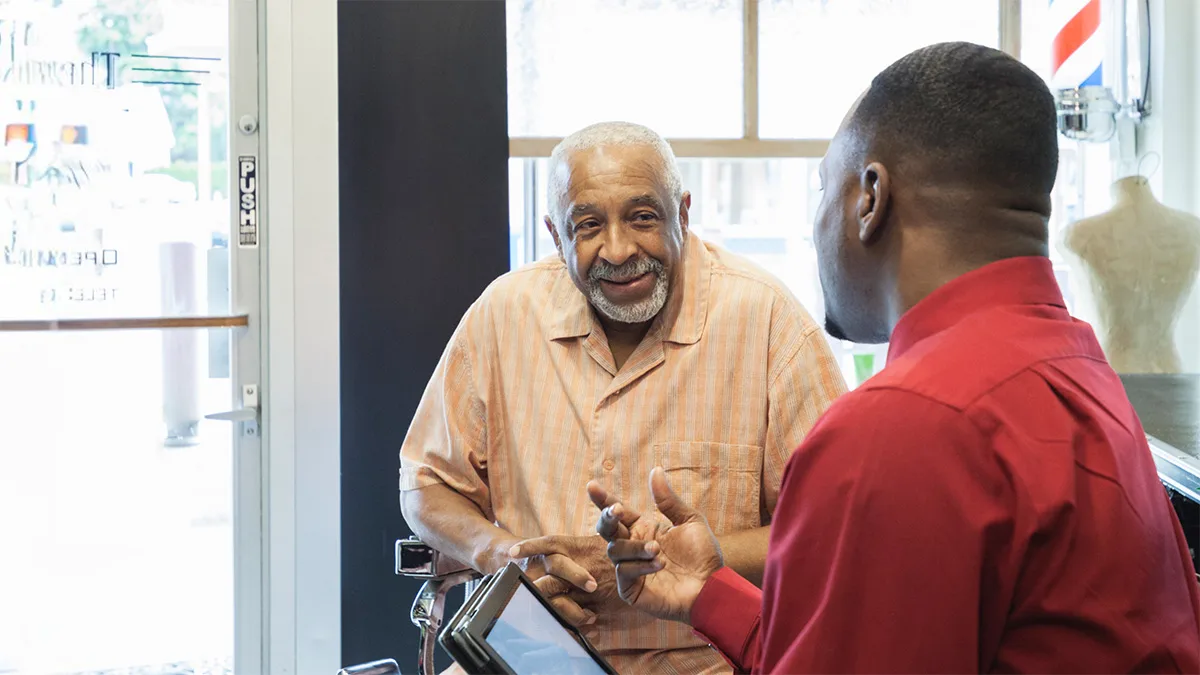
Overview
Oben Health is improving care access using AI to facilitate screenings, education and connections to treatment in nontraditional spaces like barbershops, havens of support especially in communities of color.
How to improve access to care using an AI-based platform
Peter Njongwe's brother, Paul, was only 36 years old when he died in his sleep. The culprit: heart failure due to uncontrolled hypertension. The tragedy left Njongwe and his family reeling, but also led to an initiative that could save a considerable number of lives: Oben Health.
Founded by Njongwe and led by him as CEO, the company's mission is to improve access to care using an AI-based platform that facilitates delivery of healthcare screenings and education and connection with treatment through nontraditional spaces. Those spaces are barbershops and salons — havens of communication and support within communities, especially communities of color.
In recognition of this novel approach to enhancing healthcare access, Cure awarded Oben Health with one of its first Cure Xchange Challenge: Health AI for Good prizes in 2024. We spoke with Peter Njongwe about the creation of Oben Health and what he and his team hope to accomplish.
This conversation has been edited for length and clarity.
What made you decide to launch Oben Health?
I've seen how hypertension has been normalized in our family and in our community. Paul's death was a wake-up call for all of us. I still have family members living with comorbidities, such as kidney failure, due to high blood pressure. That was an impulse to start something. If that was happening to Paul, I knew it was happening to millions of Americans across the country.
When we think about hypertension and other chronic diseases, we know we have the solutions to solve it. But what is not well-spread is awareness.
What kinds of obstacles do people face that prevent them from getting the care they need?
The Wall Street Journal recently reported that 83.3 million Americans have insufficient access to primary care. Sometimes the hours of primary care don't work with people's work hours. For people with shift work, which is common in my community, that can be a big challenge, as well as the challenge of transportation to get to primary care. They have to take time off from work, and often they have to decide between, "Do I care for myself, or do I make money to put food on the table?"
Too often people only go to the doctor when things get worse, and they use their emergency department as primary care. There is also a trust divide that has only grown since 2020, and that makes it really difficult for people to get the kind of preventive care that they need.
What made you choose barbershops as spaces to deliver healthcare screenings and education?
Barbershops and salons have been cultural hubs of our community, specifically in the Black community. There is a bond and a trust with your barber. You can have really intimate conversations. It's where you feel you're not judged and where you go consistently.
My barber gets to know me, my family and my challenges. I tell things to my barber I don't even tell my partner. That kind of trust is hard to replicate. And that's the kind of trust that we need in healthcare.
How many barbershops and salons are engaged in your program?
We currently have about 35 and are looking to expand beyond the Bay Area to Sacramento. With the Cure Xchange Challenge award, we're aiming to expand to the East Coast. New York is definitely one of the places on our list and has the highest density of barbershops. We know it would be a really great area for us in terms of the patient population we can serve and the impact we can create.
How does the program work?
Barbers and salon workers go through a 12-hour training to become community health workers. Right now we're focused on education and screening for hypertension. They receive the education to conduct a blood pressure screening, talk to their clients about what their blood pressure numbers actually mean, and provide some health coaching. They can also have conversations with the person about any barriers they may face.
How is AI used in the Oben Health model?
One of our biggest challenges is how we integrate the data that we capture in the barbershops and get it back into electronic medical records systems. The AI platform will help us with clinical decision support, how to best reach patients and how to ensure they're getting care. As a Cure Xchange Challenge winner, I am receiving mentorship from John Mattison, MD, PhD, former Chief Medical Information Officer at Kaiser Permanente. His experience is helping us understand how to collect and interpret the data.
The platform that we're building will enable our community health workers to access the tools they need. It will enable us to report and improve quality metrics and close gaps in care.
How might this model improve the care of people with hypertension?
Right now, if you have uncontrolled hypertension, the gold standard is that a doctor prescribes medication, and then you have to go to a clinic every 30 days so the doctor can manage your care. But that's really hard for some people. If we're going to make a huge difference in impacting healthcare, we've got to rethink how we can deliver care in the most effective way and meet people where they are.
That's a true cure. If we're going to help people live better lives and ensure that no family goes through what we went through with my brother Paul, that's where it starts. And that's why I'm excited to be part of this.








